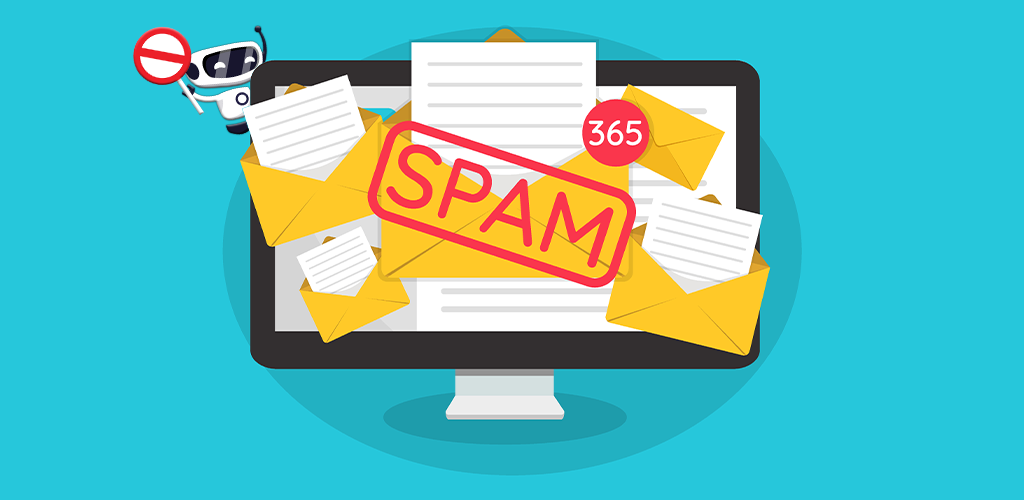February 16, 2021
Privacy Tip of the Week: Stop Spam in its Tracks
Posted by Rhiannon

In the digital age, no one is unfamiliar with or untouched by spam. These unsolicited messages affect us all, in the form of emails, texts, and phone calls. For many, dozens of spam messages clog up our devices each and every day, often from corporate sources like retail businesses, advertisers, and news agencies. While these sources are generally annoying, they’re not necessarily dangerous. Unfortunately, unsolicited messaging doesn’t only come from legitimate businesses. Spam is a great vessel for hackers and cybercriminals to send malware and viruses to unwary users, infecting their devices and stealing their data. Here’s how hackers get your information, and how to stop spam in its tracks:
- How your information is taken
- Stopping spam
How Hackers Take Your Information
Hackers need your contact information before they can send you spam messages. But most people don’t line up to hand their information over. So how do hackers get a hold of those details? There are a few different ways:
- Data Leaks: Although we hope the companies we trust with our information can protect it, data breaches are all too common. If your email address or phone number was lost in a leak, hackers can use them to spam you. Unfortunately, there is little that can be done about data leaks. However, if you know your accounts have been compromised, change your associated passwords to prevent further info theft.
- Data Sales: Even worse than data leaks, some companies may deliberately sell your data to hackers, as a form of revenue. While few companies who engage in this practice are honest about it, reading the privacy policies of any company before giving them your private information can help protect you.
- Subscriber Lists: The spam that comes from businesses, like retailers, most often is sent to you because you signed up to their email list (whether on purpose or not). You may be able to unsubscribe from these messages.
- Your Address is Public: If you share your email address publicly (for example, on social media), hackers may be able to harvest and use it.
- Your Device Has a Virus: If your device has already been compromised, the hackers behind the breach can continuously mine the information stored on it.
How to Stop Spam
At best, spam is annoying. At worst, it’s dangerous to your devices. The best way to protect yourself is by preventing spam from getting anywhere near you. Here are a few ways of doing just that:
- Report Spam: While email providers do their best to filter spam on their own, many messages still get through, whether they’re dangerous or merely annoying. However, you can help improve filtering functions by reporting spam messages instead of just deleting them. Similarly, your cell phone provider may have a way for you to report robocalls. This helps prevent them in the future.
- Use Separate Email Addresses: It’s a good idea to separate our professional and casual lives by using different email addresses for each. For example, use your main email to contact coworkers, and your casual email for online shopping. This can help you determine whether a message is spam or not.
- Make Use of Block Functions: When you receive spam emails, texts, or phone numbers, they may offer you the option to unsubscribe from further messages. However, not all companies honour those requests (some may even bury malware in unsubscribe links). Instead of taking half measures, block spammers outright so they simply cannot contact you from their address again.
You can help keep your information safe from hackers by using a VPN every time you connect to the web. HotBot VPN keeps your information safe by encrypting your data and making you anonymous online. This way, hackers and snoops can’t get a hold of your contact information or account details. Download it today for your Android, iOS, and Windows devices.
Posted by Rhiannon
More Blog Posts
February 14, 2023
How the Investigatory Powers Act Impacts Citizen Privacy
In 2016, the United Kingdom passed the Investigatory Powers Act or IP Act, into law. This act empowered the government and related agencies to access and collect citizen data, without consent. Critics immediately slammed the new law. The media dubbed it the “Snoopers’ Charter.” Meanwhile, Edward Snowden described the act as “the most extreme surveillance […] Read moreFebruary 14, 2023
How to Easily Unblock Wikipedia with HotBot VPN
Wikipedia puts a wealth of information at your fingertips. Everything from the biography of Alexander Graham Bell to the basics of quantum computing can be instantly opened by curious browsers. But what happens when you can’t access that information? Whether a business network blocks it or a particular country censors it, don’t let that slow […] Read moreFebruary 14, 2023

